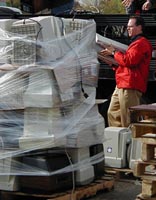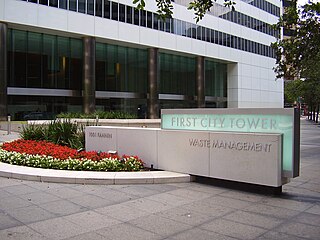
In the field of waste management, extended producer responsibility (EPR) is a strategy to add all of the environmental costs associated with a product throughout the product life cycle to the market price of that product. Extended producer responsibility legislation is a driving force behind the adoption of remanufacturing initiatives because it "focuses on the end-of-use treatment of consumer products and has the primary aim to increase the amount and degree of product recovery and to minimize the environmental impact of waste materials".

Computer recycling, electronic recycling or e-waste recycling is the disassembly and separation of components and raw materials of waste electronics. Although the procedures of re-use, donation and repair are not strictly recycling, these are other common sustainable ways to dispose of IT waste.

Electronic waste or e-waste describes discarded electrical or electronic devices. Used electronics which are destined for refurbishment, reuse, resale, salvage recycling through material recovery, or disposal are also considered e-waste. Informal processing of e-waste in developing countries can lead to adverse human health effects and environmental pollution.

Waste Management, Inc. is an U.S.-headquartered waste management, comprehensive waste, and environmental services company operating in North America. Founded in 1968, the company is headquartered in the First City Tower in Houston, Texas.
Texas Campaign for the Environment (TCE) is a grassroots advocacy 501(c)(4) Non-profit organization that works on health and environmental issues in the state of Texas in the United States. TCE began when its founders parted ways with Texans United in 1991. The organization has offices in Dallas, Austin and Houston.
The Green Box (GB) is a large metal container, designed and utilized for free public disposal and recycling of electronic waste. It is produced and sold by an eponymous California company.

This article outlines the position and trends of recycling in Canada. Since the 1980s, most mid to large municipalities in most provinces have recycling programs. As of 2012, Canada has a recycling rate around 26.8%
Californians Against Waste is an environmental advocacy organization that advocates for stronger environmental laws and more recycling at the state and local level. The organization was founded in 1977 and has sponsored numerous successful citizen initiatives. It is headquartered two blocks from California's state capitol in Sacramento.

eDay was a New Zealand initiative to hold an annual ewaste collection day, started as Computer Access New Zealand (CANZ) to raise awareness of the potential dangers associated with electronic waste and to offer the opportunity for such waste to be disposed of in an environmentally friendly fashion.
Guiyu, in Guangdong Province, China, is widely perceived as the largest electronic waste (e-waste) site in the world. In 2005, there were 60,000 e-waste workers in Guiyu who processed the more than 100 truckloads that were transported to the 52-square-kilometre area every day. The constant movement into and processing of e-wastes in the area leading to the harmful and toxic environment and living conditions, coupled with inadequate facilities, have led to the Guiyu town being nicknamed the "electronic graveyard of the world".

The environmental effects of paper are significant, which has led to changes in industry and behaviour at both business and personal levels. With the use of modern technology such as the printing press and the highly mechanized harvesting of wood, disposable paper became a relatively cheap commodity, which led to a high level of consumption and waste. The rise in global environmental issues such as air and water pollution, climate change, overflowing landfills and clearcutting have all lead to increased government regulations. There is now a trend towards sustainability in the pulp and paper industry as it moves to reduce clear cutting, water use, greenhouse gas emissions, fossil fuel consumption and clean up its influence on local water supplies and air pollution.

Electronic waste or e-waste in the United States refers to electronic products that have reached the end of their operable lives, and the United States is beginning to address its waste problems with regulations at a state and federal level. Used electronics are the quickest-growing source of waste and can have serious health impacts. The United States is the world leader in producing the most e-waste, followed closely by China; both countries domestically recycle and export e-waste. Only recently has the United States begun to make an effort to start regulating where e-waste goes and how it is disposed of. There is also an economic factor that has an effect on where and how e-waste is disposed of. Electronics are the primary users of precious and special metals, retrieving those metals from electronics can be viewed as important as raw metals may become more scarce

Electronic waste is a significant part of today's global, post-consumer waste stream. Efforts are being made to recycle and reduce this waste.

Mobile phones can be recycled at the end of their life.
Electronic waste is a serious environmental issue in China. China is the largest importer of e-waste and is home to most of the world's largest dumpsites. Rapid economic growth, coupled with the world's increasing demand for electronics has dramatically increased the amount of e-waste being disposed of. Roughly 70% of this global e-waste ends up in China.
Recycling Lives Limited, formerly Recycling Co Ltd and Preston Recycling Ltd, is a British recycling and waste management company headquartered in Preston, Lancashire. It has over 200 employees and £25 million turnover. The company founded a social welfare charity, Recycling Lives Charity, and is committed to undertaking only commercial ventures with a demonstrable charity or community benefit.
Closing the Loop is a company that offers a closed loop service for mobile phones. The Dutch social enterprise is based in Amsterdam, the Netherlands. It was founded with the aim to reduce electronic waste (e-waste). It does this by offering users and sellers of phones a way to make their device material-neutral and waste free. The company pays people in emerging markets to collect scrap phones. These phones are then recycled for Closing the Loop’s customers. The proposition works on a one for one basis, where a customer’s phone is ‘offset’ by the recycling of a broken phone. Known customers are T-Mobile, KPMG, the city of Utrecht, Rabobank and the Dutch national government.

Sustainable electronics are electronic products made with no toxic chemicals, recyclable parts, and reduced carbon emissions during production. "Sustainability is still very new, emerging business concept. Because of that, we lack uniform guidelines or standards applicable per industry sector that can help companies establish best practices."
The Plastic Pollution Coalition (PPC) is an advocacy group and social movement organization which seeks to reduce plastic pollution. PPC operates under the fiscal sponsorship of the umbrella organization Earth Island Institute.

Oladele "Dele" Abiola Ogunseitan is a Nigerian public health researcher who is the University of California Presidential Chair at the University of California, Irvine. His research considers how toxic pollutants impact human and environmental health. He is an elected a Fellow of the American Association for the Advancement of Science.










